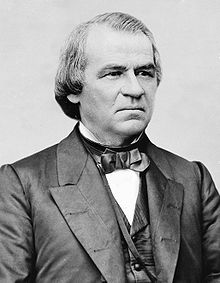 | |
| Presidency of Andrew Johnson April 15, 1865 – March 4, 1869 | |
| Cabinet | See list |
|---|---|
| Party | National Union (1865–1868)[a] Democratic (1868–1869)[a] |
| Seat | White House |
|
| |
| Library website | |
| ||
|---|---|---|
|
Personal 16th Vice President of the United States 17th President of the United States Vice presidential and Presidential campaigns Post-presidency Family  |
||
The presidency of Andrew Johnson began on April 15, 1865, when Andrew Johnson became President of the United States upon the assassination of President Abraham Lincoln, and ended on March 4, 1869. He had been Vice President of the United States for only six weeks when he succeeded to the presidency. The 17th president, Johnson was a member of the Democratic Party before the Civil War and had been Lincoln's 1864 running mate on the National Union ticket, which was supported by Republicans and War Democrats. Johnson took office as the Civil War came to a close, and his presidency was dominated by the aftermath of the war. As president, Johnson attempted to build his own party of Southerners and conservative Northerners, but he was unable to unite his supporters into a new party. Republican Ulysses S. Grant succeeded Johnson as president.
Johnson, who was himself from Tennessee, favored quick restoration of the seceded states to the Union. He implemented his own form of Presidential Reconstruction – a series of proclamations directing the seceded states to hold conventions and elections to re-form their civil governments. His plans did not give protection to the former slaves, and he came into conflict with the Republican-dominated Congress. When Southern states returned, many of their old leaders passed Black Codes to deprive the freedmen of many civil liberties, congressional Republicans refused to seat legislators from those states and established military districts across the South. Johnson vetoed their bills, and congressional Republicans overrode him, setting a pattern for the remainder of his presidency.[b]
Frustrated by Johnson's actions, Congress proposed the Fourteenth Amendment to the states, and the amendment was ratified in 1868. As the conflict between the branches of government grew, Congress passed the Tenure of Office Act, restricting Johnson's ability to fire Cabinet officials. When he persisted in trying to dismiss Secretary of War Edwin Stanton, he was impeached by the House of Representatives, making him the first U.S. president to be impeached. Johnson narrowly avoided conviction in the Senate and removal from office, but he exercised little power in his last year in office. In foreign policy, Johnson presided over the purchase of Alaska, and his presidency saw the end of the French intervention in Mexico. Having broken with Republicans, and failing to establish his own party under the National Union banner, Johnson sought the 1868 Democratic presidential nomination, but it went to Horatio Seymour instead. Seymour's defeat by Grant in the 1868 presidential election left Northern Republicans firmly in control of Reconstruction.
Though he was held in high esteem by the Dunning School of historians, more recent historians rank Johnson among the worst presidents in American history for his frequent clashes with Congress, strong opposition to federally guaranteed rights for African Americans, and general ineffectiveness as president.
Cite error: There are <ref group=lower-alpha> tags or {{efn}} templates on this page, but the references will not show without a {{reflist|group=lower-alpha}} template or {{notelist}} template (see the help page).

